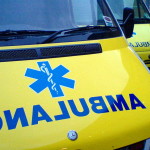Thanks to Janet from St John Ambulance for this advice ahead of the forecasted heat wave. Ed
The Met Office are predicting a heat wave this week. Clive James, Training Officer at St John Ambulance, says:
“Extreme heat can be dangerous, particularly for the very young and old, but by being prepared you can spot the early warning signs and potentially be the difference between life and death in an emergency.
“Heat exhaustion and heat stroke are the most serious problems that can develop when the mercury soars so it’s essential that people can spot the signs, such as headache and dizziness, and get them somewhere cool and rehydrated as soon as possible.”
Summer first aid advice
Treating dehydration:
- Help the person to sit down and give them plenty of water to drink.
- Giving them an oral rehydration solution to drink will help replace salt and other minerals which they’ve lost – you can buy this in sachets from any pharmacy.
- If they have any painful cramps, encourage them to rest, help them stretch and massage their muscles that hurt.
- Keep checking how they’re feeling – if they still feel unwell once they’re rehydrated then encourage them to see a doctor straight away.
Treating Sunburn
- First, cover their skin with lightweight clothing and move them out of the sun and into the shade, or indoors if possible.
- Encourage them to keep taking sips of cold water.
- Cool the skin by sponging it gently with cool water, or by soaking the sore skin in a cold bath or shower for no more than ten minutes. Repeat this if it helps ease soreness.
- If the burn doesn’t blister, then it is mild. Apply calamine lotion or after-sun lotion to help soothe the skin.
- If the burn blisters or there is other skin damage, then it is severe and they’ll need to see a doctor.
- Also watch out for and treat symptoms of heat exhaustion or heatstroke, which can be life threatening.
Treating heatstroke
- Quickly move them to a cool place and remove their outer clothing but ensure you maintain their dignity.
- Then call 999/112 for an ambulance.
- Wrap them in a cold wet sheet and keep pouring cold water over it until their temperature falls to at least 38°C (or 100.4°F). Measure this with a thermometer under their tongue or under their armpit.
- If you can’t find a sheet, fan them or sponge them down with cold water to keep them cool.
- Once their temperature seems to have gone back to normal, replace the wet sheet with a dry sheet.
- While waiting for help to arrive, keep checking their temperature, as well as their breathing, pulse and level of response.
- If they start getting hot again, repeat the cooling process to lower their temperature.
- If they lose consciousness at any point, open their airway, check their breathing and prepare to treat someone who’s become unconscious.
Treating blisters
If someone has a blister, don’t burst it as this can increase the risk of infection.
- Wash the skin around the blister with clean water.
- Gently pat the skin dry with a sterile gauze pad or a clean, non-fluffy material.
- If the blister was caused by something rubbing against the skin, cover it with a plaster – ideally a special blister plaster, as these have a cushioned pad that gives extra protection.
Treating asthma attacks
- First, reassure them and ask them to breathe slowly and deeply which will help them control their breathing.
- Then help them use their reliever inhaler straight away. This should relieve the attack.
- Next, sit them down in a comfortable position.
- If it doesn’t get better within a few minutes, it may be a severe attack. Get them to take one or two puffs of their inhaler every two minutes, until they’ve had 10 puffs.
- If the attack is severe and they are getting worse or becoming exhausted, or if this is their first attack, then call 999/112 for an ambulance.
- Help them to keep using their inhaler if they need to. Keep checking their breathing, pulse and level of response.
- If they lose consciousness at any point, open their airway, check their breathing and prepare to treat someone who’s become unconscious.
*App available from the iTunes app store.
First aid advice for heat-related illnesses can be found online





